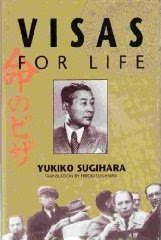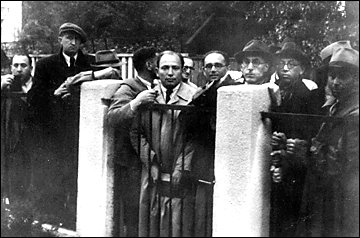 This past Sunday was the memorial service for Yukiko Sugihara, the widow of Chiune Sugihara (杉原千畝) who is better known in Japan as "Japan's Schindler." Mrs Sugihara died on October 8 at age ninety-four.
This past Sunday was the memorial service for Yukiko Sugihara, the widow of Chiune Sugihara (杉原千畝) who is better known in Japan as "Japan's Schindler." Mrs Sugihara died on October 8 at age ninety-four.
In 1995, she wrote a book called about her husband's heroic work to save the lives of thousands of Jews in Soviet-occupied Lithuania who were fleeing the Nazis.

Sphere: Related Content
Sadly, too few people outside of Japan are aware of Sugihara's story, which is a shining example of how someone can and should do the right thing even when it is a violation of rules and/or protocol and can cost one their livelihood or their freedom.
Resisting demands by Japan's German allies to turn over or kill the Jewish refugees (largely from Poland), in 1940 this lower-level diplomat issued many thousands of transit visas that allowed the ineligible refugees to head for points east (including Japan) via the Trans-Siberian railway. Had these people and their families not left, their fate would have been sealed when the Nazis occupied Lithuania the following year.
Sugihara was dismissed from his post and his wife Yukiko claims that this act of disobedience cost him his job after the war (Japan's Foreign Ministry cannot confirm that, but in 1991 it praised Sugihara's "courageous and humanitarian decision"). The circumstances are a bit too complicated for this short post, so I recommend you read what's written on the web or in books on the topic, but here is a snippet of the Wikipedia entry that provides some insight:
Sugihara continued to hand-write visas (reportedly spending 18–20 hours a day on them, producing a normal month's worth of visas each day) until September 4, when he had to leave his post before the consulate was closed. By that time he had granted thousands of visas to Jews, many of them heads of household who could take their families with them. According to witnesses, he was still writing visas while in transit in hotel and after boarding the train, throwing visas into the crowd of desperate refugees out the train's window even as the train pulled out. Sugihara himself wondered about official reaction to the thousands of visas he issued. Many years later, he recalled, "No one ever said anything about it. I remember thinking that they probably didn't realize how many I actually issued."It's easy to see how Sugihara earned his later nickname, and why the State of Israel honored him as a Righteous Among the Nations and granted he, his wife, and their descendants perpetual Israeli citizenship. He and his wife are remembered in other ways, including this film (and, interestingly, a children's book by writer Ken Mochizuki and Korea-born illustrator Dom Lee).

Above (reproduced from here): Jewish refugees at the gate, July 1940. Thousands of Jews lined up in front of the Japanese Consulate in Kaunas, Lithuania, hoping to receive transit visas allowing them to escape to the Far East and to America or Palestine.























No comments:
Post a Comment
Share your thoughts, but please be kind and respectful. My mom reads this blog.